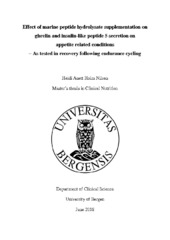| dc.description.abstract | Background: Energy homeostasis is sustained by multiple complex pathways, and appetite regulation is one of them. Malnutrition such as obesity or undernutrition, which is known to impair individual health and lower quality of life. The association between appetite regulation and gastrointestinal (GI) hormones is an attractive target for therapeutic and dietary interventions, as well as through physical activity and exercise. Ghrelin is known to increase hunger, and insulin-like peptide 5 (INSL5) is a novel hormone in appetite regulation that is suggested to also increase hunger. Aim: This study set out to investigate if 20 mg marine peptide hydrolysate (MPH) per kg body weight would affect the secretion pattern of ghrelin and INSL5 after endurance cycling, as well as to explore the effect of the appetite regulating hormones following the endurance cycling. Participants and method: The study population (n=14) was composed of a moderately homogenous sample population of middle-aged, well-trained, healthy males recruited in July of 2017. Anthropometric measurements, circulating GI hormones, self-reported feeling of satiety and a 4-day food intake record was measured in this study. Results: There is significant difference in circulating ghrelin (p = 0.014) in treatment, compared to placebo. Additionally, there was a negative effect when adjusted for body mas index (p = 0.03). A positive trend in circulating INSL5 was observed, however not significant (p = 0.12). Correlations between ghrelin, INSL5, glucose, insulin and satiety was statistically significant (p < 0.05). There is a negative relationship between INSL5 and ghrelin (p < 0.01), and a very strong, almost linear correlation between INSL5 and insulin (r = 0.93, p < 0.01). The correlations also revealed that an increase in ghrelin secretion reduced satiation, while an increase in INSL5 increased satiation. The self-reported food intake revealed that 85 % of the participants did not meet the daily recommended intake (DRI) of energy and 62 % did not meet the DRI of protein as recommended by the Nordic Nutrition Recommendation. Conclusion: This study discovered that a small amount of MPH had an effect on ghrelin secretion, and the absence of results for the other variables may be due to a low dosage. Interestingly, the novel INSL5 promotes satiation and are in undiscovered way involved in insulin secretion. | en_US |
